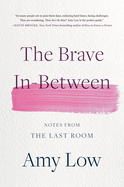
Amy Low's thoughtful memoir, The Brave In-Between, details her attempts to live with courage and compassion after receiving a stage IV colon cancer diagnosis, on top of her divorce. Low invites readers into "the last room" of life, sharing her struggles and triumphs (and some deceptively "normal" days) along her cancer journey.
Low frames her experience around St. Paul's exhortation in Philippians, chapter 4, verse 8: "Whatever is true, whatever is noble, whatever is right, whatever is pure, whatever is lovely, whatever is admirable--if anything is excellent or praiseworthy, think on these things." Low begins to see Paul's words as "the map for the most bewildering corners" of her last room, as she navigates the "constant tension between the art of living fully and the discipline of waiting well." Writing her story after several years of living with cancer, plus parenting two teenagers through a pandemic, Low shares the goodness she's found in that last room, as well as the daily struggle to remain present, juggle her illness and her life responsibilities, and love her people well--even when she has no idea how long she'll get to do any of those things.
She begins her narrative with "an awful ending": the dissolution of her marriage to Don, the father of her two children, Connor and Lucy. Readers learn from Low's introduction that Don would, however, serve as one of Low's primary caregivers during her initial rounds of treatment. She unspools the story of how they came together, then fell apart, as a couple; she then gives a brief overview of the fragile new rhythm they found as a family and her expanded responsibilities as managing director of a philanthropic organization, which included increased travel. In 2019, several years into single parenthood, with Don living several hours away, Low went to see her doctor about some symptoms she couldn't shake. After a series of increasingly worrying tests, Low's medical team found a sizable mass on her liver--a diagnosis that sent her down a path she could never have imagined.
Frank and straightforward, Low's memoir emphasizes the beauty, wisdom, and even joy she found while undergoing treatment, raising her two teenagers, and navigating complex bonds with both her ex-husband and Sebastien, a handsome surgeon who came to play an important role in Low's life and (unofficially) in her treatment. She admits to "trying to get every medical person in my story to adore me," hoping somehow that a stronger bond with her physicians might motivate them to work even harder to conquer her cancer. She wrestles with the milestones she knows she'll eventually miss: shopping with her daughter for a wedding dress, hearing her son's original musical compositions. Most of all, though, Low knows she'll eventually have to "surrender the magical mundane": the everyday moments that often quietly embody Paul's principles of truth, loveliness, nobility, and excellence.
Low details her extensive journey through chemo; her cycle of surgeries and recoveries; her emotional swings from acceptance to anger to overwhelming grief and back again; her interactions with members of her medical team, including one doctor she nicknames "Dr. Phenomenal," and her increasingly complicated relationship with Sebastien. He provides Low with medical advice when needed, and his presence is a welcome distraction--an exciting new relationship during a time when much of her life seems uncertain or sad. Ultimately, though, Low realizes that neither she nor Sebastien are truly getting what they need from the relationship, and she makes the difficult decision to let him go. Exploring their connection through the lens of Paul's words–"whatever is pure"--allows Low to examine the ways they "blurred the lines between friendship and romance," creating a pattern that ultimately proved destructive.
Most of Low's other relationships prove solid and joyful during this time. Her children are a source of delight and solace, though she also worries about their well-being (present and future). Her friends provide comfort and practical support, accompanying her to appointments and helping her plan for her teenagers' care. Even Don, flawed as he is, steps up as a caregiver, and Low appreciates his support while acknowledging the tension inherent in it. As the Covid-19 pandemic makes life and treatment even more complicated, Low nevertheless finds ways to snatch all the joy she can--ordering pizza and watching Stranger Things with her daughter; adopting a Cavalier King Charles spaniel puppy named Bonnie; even taking her kids to Rome and Florence for Christmas. All the while, she does her best to focus on Paul's virtues, seeing "new contours of beauty" even as her cancer progresses.
With humor, grace, and plenty of grit, Low lives as fully as she can in the last room, knowing her time there is limited--but remaining open to what the room can teach her. --Katie Noah Gibson

